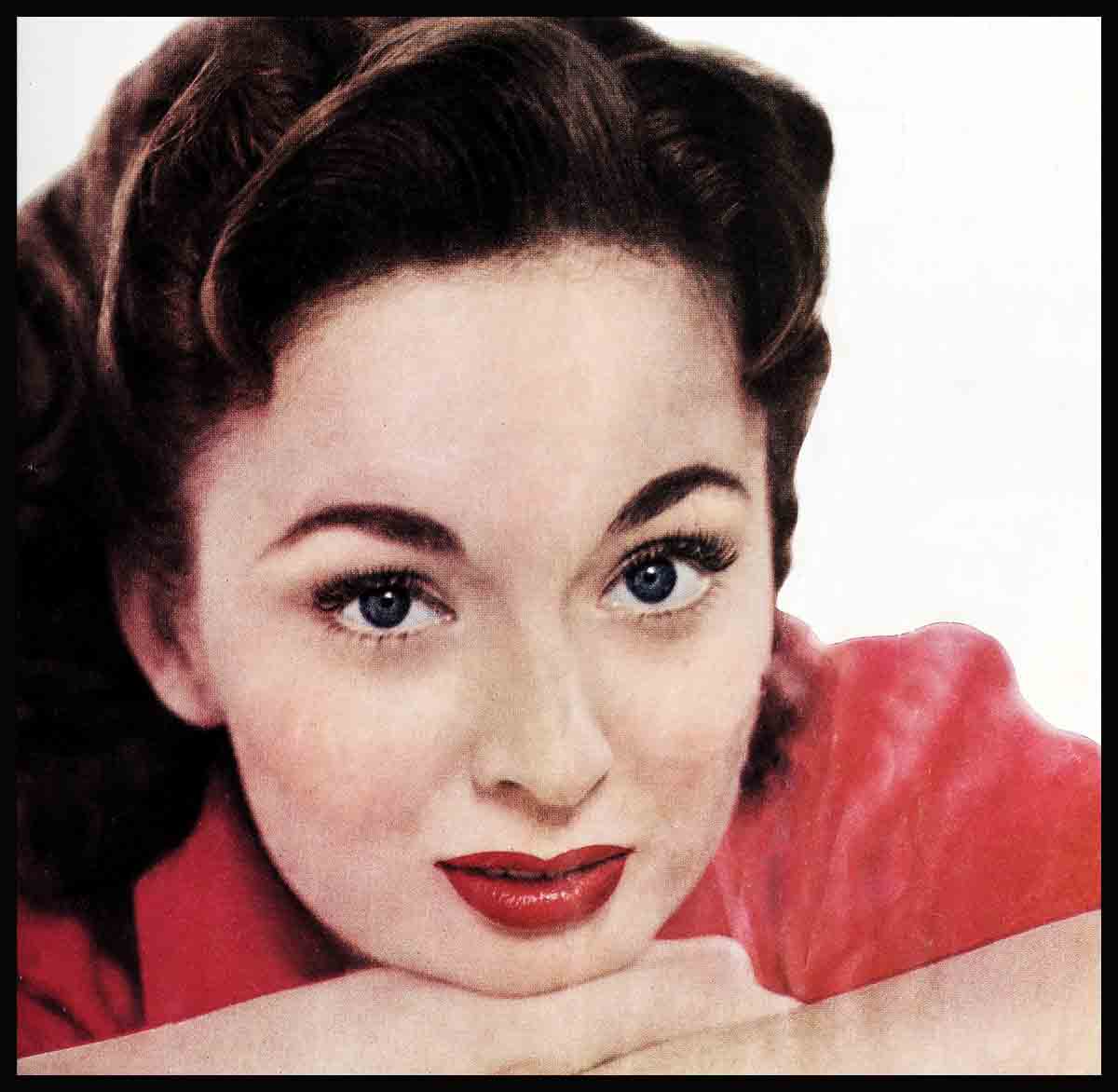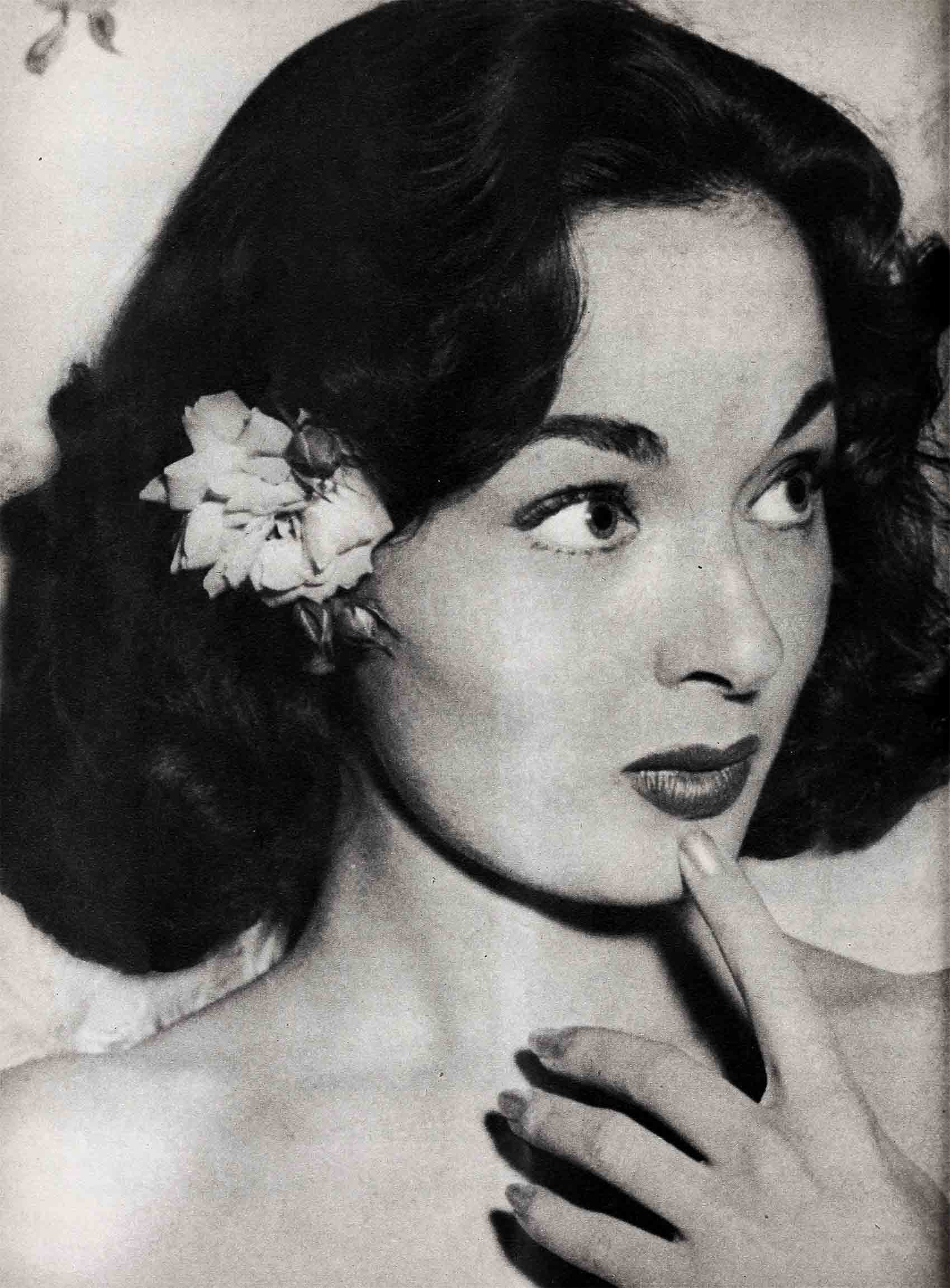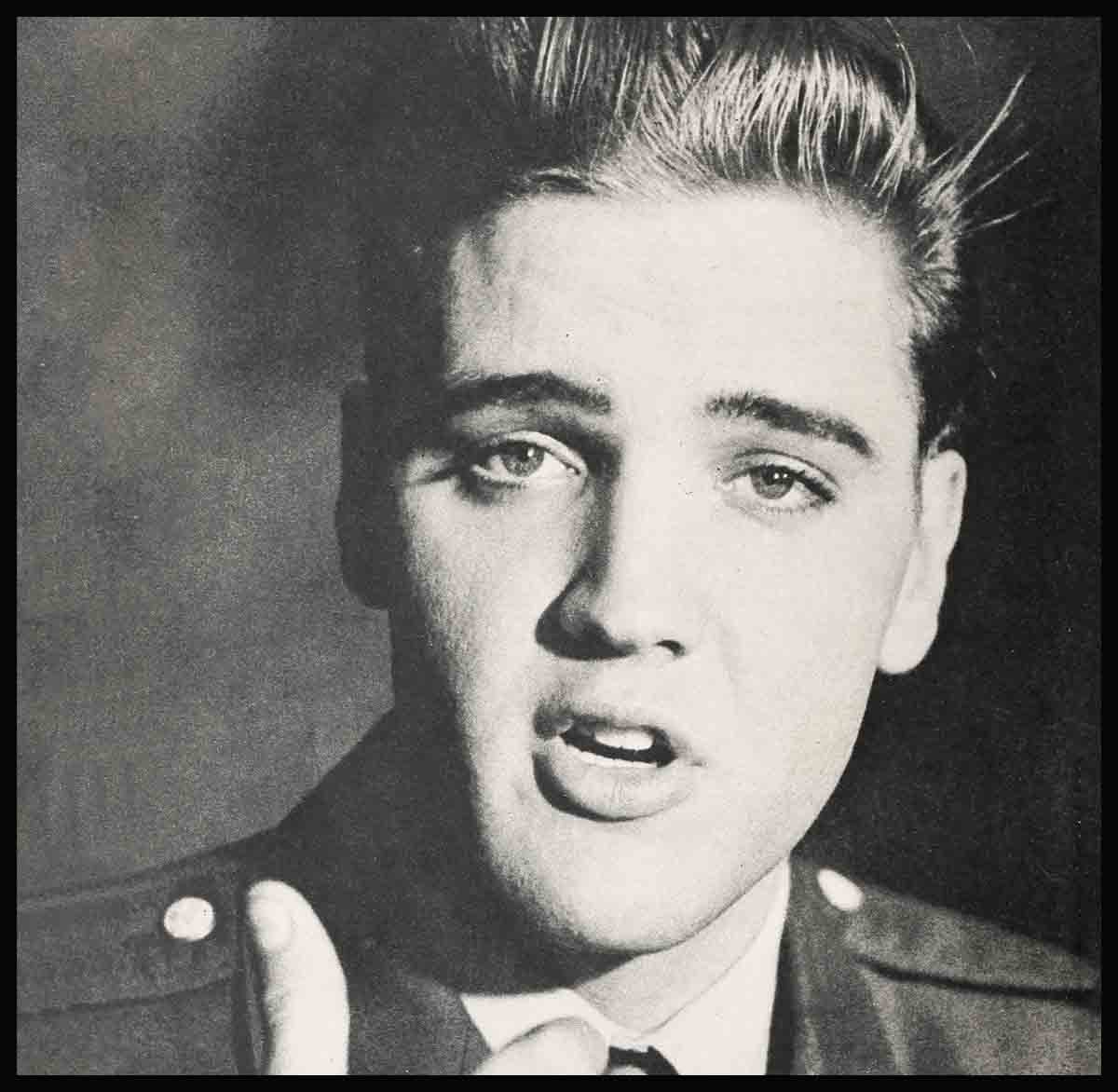
She Keeps Hollywood Guessing—Ann Blyth
Members or Hollywood’s column-wise clique swallowed their mid-morning aspirin tablets and held their heads. Then they re-read an item linking Rita Hayworth and Charles FitzSimons. Editors circled the words, writers raced to telephones—the town hummed with queries. And the principal question of the day became, “But what about Ann Blyth?”
Ann was in New York. Before she had left Hollywood, hers was the name coupled with young FitzSimons’. It was, everyone said, a perfect match . . . the beautiful star who had never lost her heart, and the handsome Irishman.
They had met in Ireland, where Ann was visiting and Charles was working in “The Quiet Man.” He glimpsed her across the lobby of her hotel, soon discovered that actor Arthur Shields was a mutual friend, and asked to be introduced.
When Charles came to Hollywood to complete his picture, he lost no time in calling Ann. There were dinner dates and movie dates and evenings spent in the Blyth living room playing favorite records. “We’re just friends,” Ann would say, but her calm, low voice failed to drown out the hopefuls eagerly shouting, “Love at last!”
In Hollywood, it is often the custom for twosomes to claim only friendship. Then, several days later, they return from their Las Vegas wedding to set up housekeeping. Some stars will say that black is white and white is chartreuse, if they think it will gain an extra printed line. Ann has a way of saying what she means—of being the person she appears to be. It is probably this rare forthright quality that keeps Hollywood guessing.
Since her screen debut, Ann’s life has been an open book. There are chapters on her early poverty, her successful career, her religion, her home life, her dates. However, while the facts are a matter of public record, Ann herself remains a puzzle. There are questions about Ann Blyth yet to be answered.
For instance, it has been written that she is the sweetest actress alive. If she has a temper, no one can remember having heard from it. Doesn’t she ever blow her top?
She is calm and poised, possessing a dignity beyond her years. Can such dignity be a companion to good wholesome fun?
She lives with her aunt and uncle in an unpretentious Valley home. Countless other young stars have remained beneath the family roof—but only for a while. Sooner or later, the apron strings are loosened. When will they loosen for Ann?
She has as many dates as any girl in Hollywood. Eligible bachelors clamor. to meet her. How has she escaped love?
She presents a picture of Miss Perfection. Is she too good to be true?
“People are always asking what Ann is really like,” said one of her best friends recently. “They all seem to think she’s some sort of mystery.
“Well, she’s not like so many of the Hollywood actresses. She’s different. Why don’t people realize she’s a gem and leave well enough alone?”
Because she is an actress, Ann doesn’t expect privacy. But when she makes a statement she expects to be believed. Once she was asked if she had a temper. She replied with complete logic, “Well, doesn’t everyone?”

She has her pet peeves, too. For instance, she dislikes having a man open a conversation with, “As a woman you wouldn’t understand this, but . . .”
Upon occasions, she does explode. However, she is extremely careful about letting her temper show. Ann has a great respect for people and their feelings. The slightest incident may upset her. At one party, she was introduced to a man whose last name was similar to a first name. When she said goodbye she made the mistake of mixing them. Later, realizing the mistake, she spent a great deal of time worrying about the matter. She was afraid she might have offended him.
Tempers often flare in studios. But you’ll never hear of Ann holding up production by stalking off a set. She has yet to be involved in a heated argument. This is a matter of common sense, she feels. Ann can be depended upon to handle almost any situation. She’s nice, yet firm. Consequently, she wins her battle or, if there is a compromise, it is generally in her favor.
When Ann went on loanout for a certain film, a front office request came through that she dye her hair blonde. Ann objected quietly. She stood her ground. Finally, she suggested compromising—having a strand or two peroxided. This made everyone happy.
When she was asked to go on loanout to RKO for “One Minute to Zero,” Ann realized that if she were to step into the role originally scheduled for Claudette Colbert, there would have to be script changes. This expensive last minute problem is costly—and, in this case, had not been mentioned. There was no storming on Ann’s part. There was restrained conversation. And the script was revised.
“They say Ann is quiet,” said another of her friends. “I think that’s because she has such a tremendous amount of poise. It seems to rattle strangers. They start talking and she hasn’t a chance to get a word in edgewise.”
As for her seemingly ever-present dignity, the fun part of Ann’s life has been overlooked. This is undoubtedly because few people have ever seen her at an amusement park. She’s like a kid on a holiday. She’s an authority on rolly coasters. And who, pray tell, can maintain dignity on a rolly coaster?
Ann attends industry social events and is gracious and photogenic, but she really relaxes with her family and close friends. While‘ she is not a girl-about-town, she loves parties—and she’ll give one at the drop of a hat, an anniversary, a holiday, or simply a thought. It is at these small soirées that the usually “very reserved” Miss Blyth may be found on her knees throwing cards into a hat or whooping it up in a brisk game of charades.

There is nothing wrong with Ann’s sense of humor. She dislikes cruel practical jokes, but when a gag is involved, she’s quick on the uptake. When Ann visited New York, Betty Lynn, one of her closest friends, dropped by to stay with her.
They talked until late and, finally ex-hausted, were almost asleep when the phone rang. It was Roddy McDowall, all wound up and very gay. But he didn’t want conversation. He wanted music. And he wanted to make it. So for ten minutes, Ann patiently hung on to the receiver while Roddy yodelled his version of the modern opera, “The Telephone.” “Hello, hello, hello,” he sang over and over again. Ann nodded drowsily. Finally he paused long enough for her to murmur a sleepy “goodbye” and hang up.
But a few minutes later, the phone rang again,. “Roddy,” announced Betty in complete exasperation.
This time Ann opened both eyes wide and reached for the phone firmly. She sang every song—full verse and chorus—that she could think of. Each time she stopped to catch her breath, she could hear Roddy protesting, “Please . . . please, I really do want to talk to you.” But on she went, relentlessly. She finally finished off with a rousing chorus of “Hello’s” sung to the same melody and with the same fervor as Roddy’s inconsiderately timed chorus. And then, with a crashing crescendo, she pronounced one decisive “Goodbye,” and hung up.
If Roddy really did have something to say, he knew once and for all that that wasn’t the night to try and say it.
Mr. A. G. Bell’s fabulous invention was more trouble to Ann than it was worth several times during her New York trip.
Although her voice is anything but common-place, she couldn’t seem to convince people that she was really she. The fact that her Gotham trip was sudden—and unheralded—added to the complications. One chum she phoned—a girl she’s known for years—insisted that Ann was somebody called Esther, even after she ran through a series of highly personalized “remember when’s” to identify herself. Every time she called the hotel valet for service, he mistook her for his girl-friend, and would coo lovingly and at length to “Mabel” before Ann was able to explain that she wanted a suit pressed. And the bell captain kept calling her “Baby, darling” when she phoned. He says she sounds just like his daughter.
Ann was amused by it all, rather than irritated. “This is good to know,” she laughs. “Just think how convenient it will be—if I want to travel incognito.”
When Ann’s at home with her Aunt Cissy and Uncle Pat, there’s plenty of gaiety and fun.
Uncle Pat likes to tease, which is completely in keeping with their happy home life. There is little doubt about the fact that Ann, Pat and Cis will be together until Ann marries. They’re a close-knit and contented family. Their gaiety is contagious and they have a way of making friends feel welcome and wanted, which is probably one reason that the Blyth living room is always over-run with young people. Ann’s escorts will take a home-cooked meal by Aunt Cissy anytime in preference to a Romanoff special.
Ann has never chosen her dates for name value. Dick Clayton, actor turned agent, is an old friend. She also goes with Scott Brady, Dr. McNulty, L.A. physician, and automobile man Tom Bevans.
And then, of course, there is Charles FitzSimons . . . the man Hollywood cast as Ann’s Prince Charming. A lawyer in Europe, he also has had an impressive theatrical background. He acted with the famed Abbey Theatre in Ireland. He directed and produced shows in London—now pursues his career in Hollywood.
Ann wants to marry. She would like a large family—“at least four, maybe six children.” To date, she has had a great many responsibilities in both professional and private life. And this has left little time for romance. Then, too, she has seen a lot of unhappiness. And because of her religion and her belief in a good, lasting marriage, she will be cautious.
Ann will continue to keep Hollywood guessing, but there is no headline-happy curiosity involved. The so-called hardboiled town simply wants its favorite girl to find happiness.
THE END
—BY JANE CORWIN
It is a quote. PHOTOPLAY MAGAZINE SEPTEMBER 1952





vorbelutr ioperbir
17 Temmuz 2023Some truly quality content on this website, saved to bookmarks.